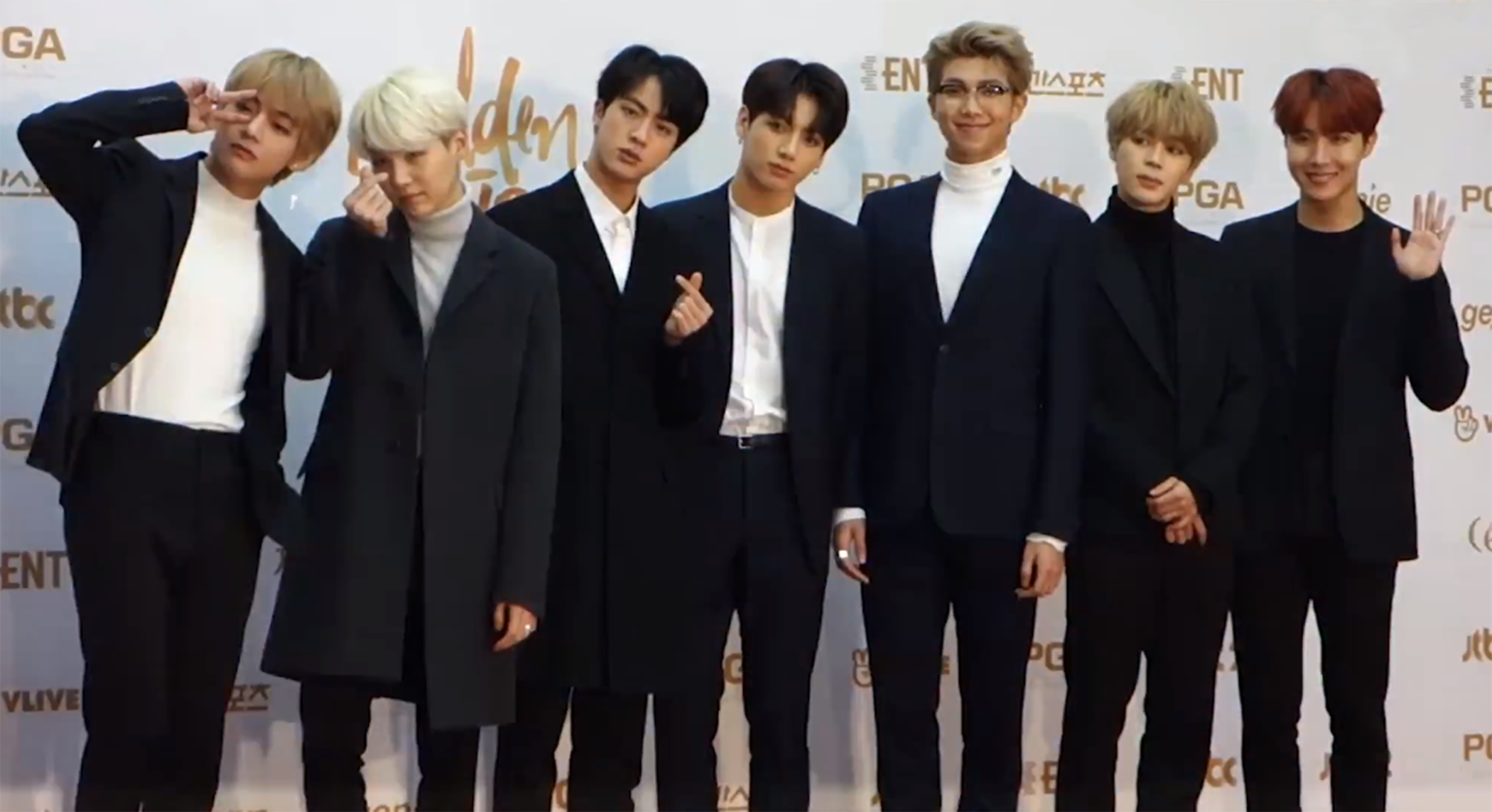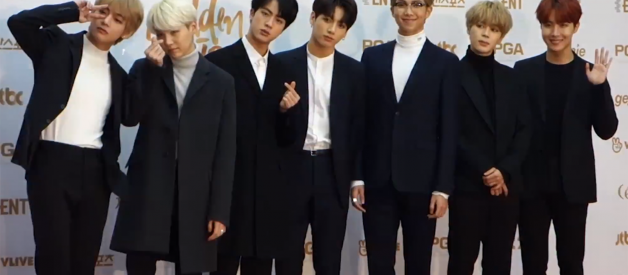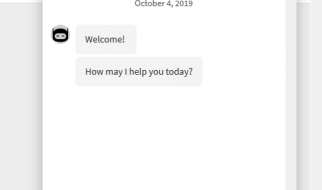 BTS at the Golden Disk Awards via ????? (NewsInStar)
BTS at the Golden Disk Awards via ????? (NewsInStar)
?Sometimes good things happen, bad things happen, unexpected things in life happen. So I want to say, ?It?s never your fault, Jungkook,?? RM, BTS?s main rapper and leader, consoled his band mate during the first night of their London concert.
The moment was an unexpected one, brought on by an accident Jungkook, the main vocalist and youngest in BTS, suffered a few hours before their show. The accident, described in an official statement as a ?collision with floor furnishings,? caused Jungkook to get stitches on his heel and forced him to perform seated for the duration of the concert.
Always professional, the group took care to deliver a great performance in front of the sold-out crowd while ensuring Jungkook was never left alone on stage. At one point, overcome with emotion, Jungkook broke down crying at the end of the concert and Jimin, one of the vocalists, rushed across the stage to comfort him.
With these incidents as a backdrop, RM continued, ?Of course I?d like to say we?re sorry and sad for today?s things but we did our best and we will do our best tomorrow.?
His words were brief, but with them RM managed to encapsulate the heart of his group?s Love Yourself campaign: having the courage to face your faults and weaknesses, and having the compassion to forgive yourself for them.
Origins
For those less familiar with the band, BTS is a seven member Korean boy group that debuted in June, 2013. Composed of three rappers (RM, SUGA, and j-hope) and four vocalists (Jin, Jimin, V, and Jungkook) the group derived its acronym from its Korean name, Bangtan Sonyeondan (?????), which translates as ?Bulletproof Boy Scouts.?
The name was chosen to represent the main goal of the group: to protect and to talk about the problems and worries of people in their teens and twenties. Their debut single, ?No More Dream,? discussed the problem of children throwing away their futures and dreams for mindless studying. Their first three albums, making up the ?School Trilogy,? continued on this theme, as well as critiquing other aspects of society.
From the very beginning, BTS?s music has been centered around youth and social critique. But the development of the Love Yourself series took the group beyond merely critiquing society and is their attempt at offering some solutions.
While the first album in the Love Yourself series was released in September, 2017, the group began working on the series in March of 2016. This was before their second full album, Wings, catapulted them to the top of the K-pop scene and long before they started gaining any mainstream recognition in the west. Their nomination for Top Social Artist at the Billboard Music Awards wouldn?t come until over a year later.
While they had debuted from a small agency in relative obscurity, BTS had gained a moderate level of success in 2015 after the release of their two part series, ?The Most Beautiful Moment in Life (????).? Their star was certainly ascending in early 2016, but they were far from the juggernaut they would become in the next two years.
Reflecting back on 2015 and 2016, both SUGA (lead rapper and a frequent producer for the group) and RM described those years as an extremely difficult period for them mentally. SUGA released a mixtape in August of 2016, titled Agust D, which spoke explicitly about his struggles with depression and social anxiety.
At the end of the same year, RM released ?Always,? a song that opened with the lines,
?One morning, I opened my eyesAnd wished I was deadI hoped someone would kill meIn this loud silence.?
Though BTS had attained a certain level of financial success, they were the frequent target of attacks and ridicule on the internet, including accusations that their company had inflated their sales (proven untrue after the company, Big Hit Entertainment, requested an official investigation) and that they were guilty of ?plagiarism? because they had performed wearing school uniforms after another ? and at the time more popular ? boy group had worn school uniforms for their concept the year before.
So it was in this atmosphere, one of uncertain success, continued struggle, and frequent criticism that the Love Yourself series was born. On the group?s fancafe (a sort of private message board for fans and the group members to post on) RM once wrote that loving yourself could seem like an unobtainable heat shimmer flickering before your eyes. The Love Yourself series is a reflection of the seven members chasing after that heat shimmer and sharing what they learned on the way.
The Albums
The Love Yourself series is a four part series made up of three albums and one video release arranged into sections based on a traditional Asian storytelling format: ? (beginning), ? (development), ? (twist), and? (conclusion). Through the three albums, BTS tells a story about falling in love, an inevitable breakup, and an epiphany about self-love.
The first album, Love Yourself ?: Her, focuses on loving another. The album?s intro, performed by Jimin, has the vocalist believing fate brought them together with their love, who is the ?blue penicillin? saving them. The title track, ?DNA,? expands on this theme, boldly declaring,
?From the day of the universe?s creation and beyondThrough the infinite centuries and beyondIn the previous life and maybe the next tooWe?re eternally together.?
The final track of the album, ?Outro: Her? is performed by the three rappers of the group (RM, SUGA, and j-hope) and offers the most explicit hints that the ?love? explored in the previous tracks cannot last. SUGA?s verses darkly warn,
?I can never take off the maskBecause the me behind this maskIs not the one you know?
Following the foreshadowing of the previous album, Love Yourself ?: Tear sees the destruction of the love described in Her through the intro song ?Singularity? performed by vocalist V and through the title track, ?FAKE LOVE.?
Masks are a reoccurring motif in the music videos for both songs. V dons one at the end of his solo after wistfully singing, ?Have I lost myself? Or have I gained you?? The teasers and the extended version of the ?FAKE LOVE? music video see all of the members hiding themselves behind customized Carnival masks.
The message is clear. A love that?s based on changing or hiding your true self can never be fulfilling and will ultimately tear apart. This builds on the underlying theme of the Love Yourself series: before you can truly love someone else, you must first be able to love yourself.
While Her and Tear explored the doomed nature of a life without self-love, Love Yourself ?: Answer offers a solution. Jin, the final vocalist to have a solo, lays out the group?s message in the emotional intro track, ?Epiphany.? The full lyrics of the song walk the listener through the group?s revelation and the error of trying to hide your true self, but the chorus contains the heart of the groups message,
?I?m the one I should love in this worldShining me, precious soul of mineI finally realized so I love meNot so perfect but so beautiful?
The title track, ?IDOL? ties this message explicitly to BTS?s personal history as a group. In Korea, ?idol? groups are looked down upon even more severely than boy bands are by western audiences. Idol groups are often called manufactured puppets and their fans are regularly derided as rabid teenage girls.
BTS has always prided themselves as being the creators of their own music and lyrics. The group was first conceived of after RM?s underground rapping caught the attention of the president of their company. Even before BTS?s debut in 2013, RM wrote lyrics for other groups and in 2017 SUGA received an award for producing work he did outside BTS.
So when RM confidently states, ?You can call me artist. You can call me idol. Or whatever else you want. I don?t care,? in the opening lines of ?IDOL? he?s speaking directly to the critics that have dogged their work for years. The label you give BTS doesn?t matter to them, not as long as they know themselves.
Love Myself and UNICEF
On September 24, 2018 BTS gave a speech at the UN General Assembly as part of the launching of a new initiative focused on youth. The speech came about a year after the group first launched their ?Love Myself? campaign, a partnership with UNICEF?s End Violence program that has so far raised over a million dollars through proceeds from album sales and other merchandise.
In the speech, RM reflected on his childhood and what the message of ?love yourself? has meant to him. The seven minute speech lays out the complete message BTS has spent the past two years working to convey through their music.
via Washington Post
The message, not always fully covered by the media that reported on the speech, is more than the boilerplate feel-good sentiment it?s sometimes reduced to, often with the stipulation that the message is more radical in Korean society.
?Maybe I made a mistake yesterday, but yesterday?s me is still me. I am who I am today, with all my faults. Tomorrow I might be a tiny bit wiser, and that?s me, too. These faults and mistakes are what I am, making up the brightest stars in the constellation of my life. I have come to love myself for who I was, who I am, and who I hope to become.?
Self-love and self-help have a long history of being tied to self-improvement. Countless books advise you to ?go easier on yourself? even as you ?fake it until you make it.? BTS?s message is different. Loving yourself is not presented as a means to an end, but an end unto itself. There?s no faking, no minimizing flaws to focus on strengths. Just love and being.
?These faults and mistakes are what I am, making up the brightest stars in the constellation of my life.? This sentence is perhaps the most radical of the speech and it?s what makes BTS?s message different from so many others.
So often we try to move past our mistakes by saying things like, ?that wasn?t really me,? or ?I was a different person back then.? This message says the opposite. The brightest stars, your most visible and important features, are your flaws and your mistakes. At a first listen, the message can sound horrifying. How can the things I like least about myself, the things I want most to hide, be the most important?
But that?s the key to their message. That stomach lurch, that sick feeling that bubbles up at the thought of embracing those flaws is what makes self-love so difficult. Because everyone wants to paper over their faults and focus on the ?lovable? aspects of themselves.
Until you accept those darker aspects of yourself, the shadows among the light, the ?self? you love won?t be your true self but an idealized version. That?s why loving yourself takes courage and forgiveness. You need courage to face your true self with all your flaws and imperfections and you need to have the compassion to forgive yourself for them.
A couple weeks after giving their speech at the UN, BTS held their first stadium concert ? the first stadium concert for any Korean artist ? in the United States. After reflecting on the historic moment, RM closed his comments by saying,
?It was never intended but it feels like I?m using you guys to love myself. So I wanna say something, please. Please use me, please use BTS to love yourself. Because you guys help me learn to love myself, every day.?
BTS has broken countless barriers as Korean artists in the west but their greatest accomplishment isn?t chart rankings or album sales or sold out concerts. They?ve reached countless fans and been a source of comfort and inspiration. Just like their company?s motto which appears before every one of their music videos, they?ve become ?music and artists for healing.?


